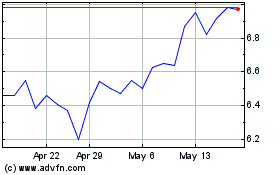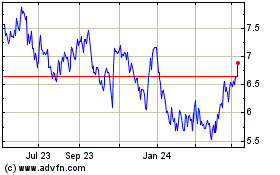UPDATE: Malaysia Stalls Lynas Rare-Earth Plant
01 July 2011 - 3:00AM
Dow Jones News
A plan to break China's dominance over rare-earth metals
suffered a setback as Malaysia's government put restrictions on a
plant due to start producing thousands of tons of the materials
within months.
The 700 million ringgit, or roughly $230 million, processing
plant under construction by Australia's Lynas Corp. (LYC.AU, LYSDY)
is intended to produce about a sixth of the world's supply of
rare-earth elements when it hits full production, which is expected
for as early as next year.
Rare-earth metals are used in a range of industrial and
technology applications. China has 90% of global production and has
been limiting its exports, which has raised global concerns about
potential shortfalls in supply and over reliance on a single
source.
The potential setback comes as rivals of Lynas are rushing to
market new rare-earth products. The 17 elements are favored for a
host of niche applications because of their unusual
characteristics. Magnets made with the rare-earth minerals
neodymium and praseodymium are uniquely strong, making them
valuable components in wind turbines and computer hard drives.
Rare-earth phosphors such as europium and yttrium are in demand to
tweak the color of compact fluorescent light bulbs and LED
displays.
But Malaysia's government forbid Lynas from importing raw
materials and starting operations at the plant's Gebeng industrial
site until the company complies with recommendations in a report
commissioned by the International Atomic Energy Agency. The IAEA
review, conducted by an international team of experts and concluded
in June, identified 10 issues to be addressed before the plant
could start up.
Many Malaysian residents are concerned that the operation could
cause lasting environmental damage, although the IAEA mostly
supported Lynas's contention that the plant will be safe. Gebeng is
on the fringes of Kuantan, a port city of around 500,000 on the
steamy east coast of the Malaysian peninsula.
"The government reiterates its position that public safety
remains its highest priority and [the government] will do whatever
is necessary to ensure this is not compromised," Rebecca Fatima Sta
Maria, secretary-general of the Ministry of International Trade and
Industry, said in a prepared statement.
Lynas said Thursday it still will be able to meet targets to
start operations at the site as soon as September, although
analysts expressed doubt about that timetable.
"The start-up was always pretty ambitious and I'd be very
surprised if this news doesn't delay that. You would have to think
it's going to be a minimum of six months' delay and probably 12
months," said Michael Evans, an analyst at CLSA in Sydney.
Lynas Chief Executive Nicholas Curtis said the plant remains on
track to start deliveries of rare earths next year. "We expect to
deliver some product in the first half of 2012 and we'll be fully
operational by the second half," he said at a Kuala Lumpur news
conference.
Among its recommendations, the IAEA said Lynas should be
required to submit a plan for managing waste from the plant once it
closes, and to establish a fund for decommissioning the site and
bringing it back to normal use.
Lynas has said it expects its main deposit at Mount Weld in
Western Australia, which has started producing materials to feed
the Gebeng plant, will be in production for at least 20 years.
Curtis said a "considerable body of work" must be completed to
fulfill the IAEA's requirements but that it can be done well in
advance of the company's timetable.
At the heart of the dispute is iron phosphogypsum, a crumbly,
off-white waste product. When Gebeng hits full capacity it will
produce 20,000 tons of rare-earth materials and 64,000 tons of
phosphogypsum every year--enough to cover a one-hectare site to a
depth of five stories. Around 106 tons of thorium, a radioactive
element formerly used in gaslight mantles and currently being
investigated as a fuel for certain nuclear reactors incapable of
producing plutonium, would be distributed throughout the waste.
Lynas has outlined tentative plans to recycle the waste as a
building material or for building artificial reefs. The IAEA report
found that the thorium waste would be at "relatively low
concentrations," with radioactivity at a low enough level that the
agency wouldn't consider it a radioactive material when being
transported.
But Fuziah Salleh, the representation for Kuantan in Malaysia's
Parliament and an opponent of the project, said the waste still
would be too risky for use in the country and suggested it be kept
in a nuclear-style storage facility. "The waste must not be
recycled. It could be sold back to Malaysians by irresponsible
vendors," she said.
China has been tightening controls on exports from its mines
since last year by raising the threshold for entry, imposing
stricter environmental standards and slashing export quotas. That
has driven the price of the elements up: The basket price for
rare-earth materials in Australia's Mount Weld deposit hit $204.85
a ton on Monday, up from $10.32 a ton in 2009.
Denver-based Molycorp Inc. (MCP) has said it expects to start
producing 19,050 tons a year of rare-earth materials from its
Mountain Pass mine in California next year. And the arrival of
other new producers seeking to profit from price increases has led
some analysts to predict that the world will have an oversupply of
the most common rare-earth materials by 2015. Total global
production last year was 114,800 metric tons.
-David Fickling, Dow Jones Newswires;
david.fickling@dowjones.com
-Ankur Relia, Dow Jones Newswires; ankur.relia@dowjones.com
Lynas Rare Earths (ASX:LYC)
Historical Stock Chart
From Dec 2024 to Jan 2025

Lynas Rare Earths (ASX:LYC)
Historical Stock Chart
From Jan 2024 to Jan 2025
